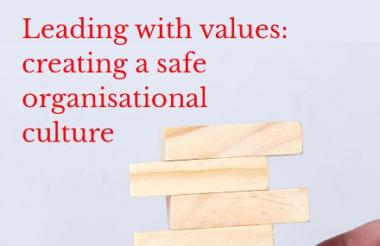The government should create a centre of excellence to help improve safeguarding policies and practices in charities, according to an Acevo report published today.
Acevo has published a report with recommendations to improve safeguarding at charities, including a call for the government to create a centre of excellence.
The report, Leading with values: creating a safe organisational culture, says strong moral leadership at charities can help to create safe workplace cultures where abusive and bullying behaviour is better dealt with.
It says moral leadership requires charities to be “values led”, whereby “authentic, relevant” values are clearly communicated internally and actively demonstrated by all those working in the charity.
“Values should be the golden thread that runs through all decision making in the charity,” it says.
The report says safeguarding issues must be prioritised by charity leaders, and that safeguarding teams must have adequate resources to take the action they need to.
It also says charity leaders should be open to learning new ways of developing themselves and the organisation they lead so staff and volunteers are not afraid to challenge the status quo.
Centre of excellence
The report says a safeguarding centre of excellence should be created as part of the government’s upcoming civil society strategy.
It says the centre should include the reinstating of the Safe Network, a service which provided safeguarding support to the voluntary sector from 2009 to 2016.
The service was run by the NSPCC and Children England but closed shortly after funding from the Department for Education ended in 2015.
Acevo also recommends that research is commissioned to examine bullying cultures within charities, and what can be done to reduce the risk of them occurring. It says this research should include the voices of those that have experienced harm.
Vicky Browning, chief executive, said: “Abuse, harassment, bullying and exploitation appal me and every other civil society leader that goes to work every day with the intention of making the world better.
“Good leadership is about collaboration, generosity, transformation and empowerment. Good leaders have a relentless focus on the people they serve.
“However, good leadership is also a skill – it is not something you are born with. There needs to be an open discussion about the challenges facing leaders and the support they need to lead safe organisations.
“This report is the beginning of that discussion and the recommendations within it are designed to further strengthen the charity sector to reduce the risk of future harm.”
Lack of diversity
Acevo says a lack of diversity at senior leadership and board level in the charity sector should be tackled to create a better culture of constructive challenge.
It says groups of people who share a similar background and experiences can tend to “groupthink”, whereby they set aside their own beliefs in order to reach a consensus.
“This approach is the antithesis of moral leadership,” it says.
The report also says charity leaders should assess situations in their organisation where there is an imbalance of power and take action to reduce risk, as these situations are most fertile for abusive behaviour.
It says charities should consider how power can be more evenly distributed and how to mitigate the risk of misuse of power.
DBS checks
The report also mentions Disclosure and Barring Service (DBS) checks, a topic which came to the fore after an Oxfam whistleblower expressed concern earlier this year that retail volunteers had not undergone such checks.
However, the report says DBS checks should not be required “unless an assessment has been made of its appropriateness”.
It says: “Leaders should recognise that the fear of a DBS check, by people with and without a criminal record, can lead to people who would add significant value to the charity sector being excluded.
“There are over 11 million people in the UK with a criminal record, of those approximately 60,000 are barred from working with children and adults at risk. Leaders should understand that in the majority of circumstances it is OK to hire someone with a criminal record.”
The report is part of a joint project led by Acevo and NCVO, developed in response to the Charity Commission’s domestic charity safeguarding summit in March.
|
Related articles












